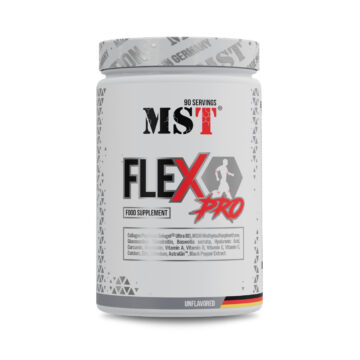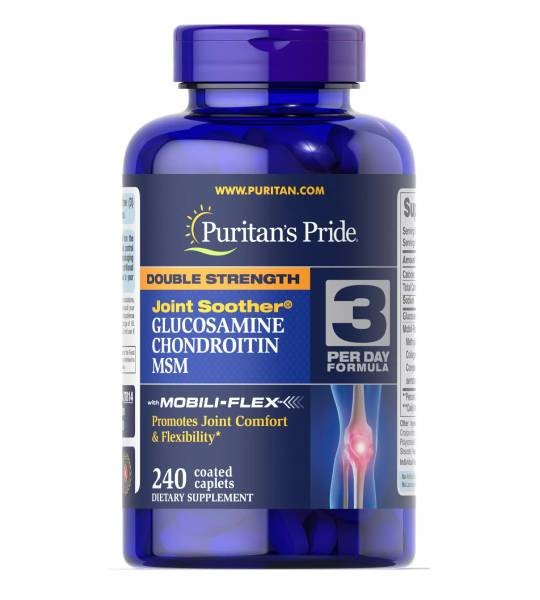
Chondroitin Sulfate
by NutraLife Labs
Key Benefits
- Supports joint health and mobility
- Helps to reduce joint pain and stiffness
- May promote cartilage regeneration
- Supports healthy inflammatory response
Product Overview
Chondroitin Sulfate: A Comprehensive Overview
Chondroitin sulfate is a naturally occurring substance found in cartilage, the tough, flexible tissue that cushions joints. As a dietary supplement, chondroitin sulfate is often used to support joint health, reduce pain associated with osteoarthritis, and improve mobility. It is often taken in conjunction with glucosamine.
What is Chondroitin Sulfate?
Chondroitin sulfate is a complex carbohydrate molecule that plays a crucial role in maintaining the structure and function of cartilage. It helps cartilage retain water and elasticity, which are essential for its shock-absorbing properties. Supplemental chondroitin sulfate is typically derived from animal sources, such as bovine (cow) or porcine (pig) cartilage, or from marine sources.
How Does Chondroitin Sulfate Work?
Chondroitin sulfate is believed to work by several mechanisms, including:
- Inhibiting enzymes that break down cartilage.
- Promoting the synthesis of new cartilage components.
- Reducing inflammation in the joints.
- Improving joint lubrication by increasing the production of synovial fluid.
What are the Potential Benefits of Chondroitin Sulfate?
Research suggests that chondroitin sulfate may offer a range of benefits for joint health. These include:
- Pain Relief: Studies have shown that chondroitin sulfate can help reduce pain associated with osteoarthritis, particularly in the knees and hips.
- Improved Mobility: By supporting cartilage health and reducing inflammation, chondroitin sulfate may improve joint mobility and flexibility.
- Reduced Stiffness: Chondroitin sulfate may help alleviate joint stiffness, particularly in the mornings.
- Cartilage Protection: Some evidence suggests that chondroitin sulfate may help protect cartilage from further breakdown.
Is Chondroitin Sulfate Right for You?
If you are experiencing joint pain, stiffness, or reduced mobility, chondroitin sulfate may be a beneficial supplement to consider. However, it is important to consult with a healthcare professional to determine if chondroitin sulfate is right for you and to discuss potential risks and benefits.

How It Works
How Chondroitin Sulfate Works:
Chondroitin sulfate works through several mechanisms to promote joint health:
- Inhibition of Cartilage Degradation: Chondroitin inhibits enzymes like metalloproteinases that break down cartilage matrix.
- Stimulation of Cartilage Synthesis: It stimulates chondrocytes (cartilage cells) to produce more collagen and proteoglycans, essential components of cartilage.
- Anti-inflammatory Effects: Chondroitin reduces the production of inflammatory mediators like cytokines, decreasing joint inflammation.
- Improved Synovial Fluid Production: It may increase the production of synovial fluid, lubricating joints and reducing friction.
- Water Retention: Chondroitin's structure attracts and retains water, providing hydration and elasticity to the cartilage tissue. This contributes to the shock-absorbing properties of the joint cartilage.

Benefits & Research
Benefits of Chondroitin Sulfate:
- Reduces Joint Pain: Studies show that chondroitin can decrease joint pain associated with arthritis.
- Improves Joint Function: Helps improve mobility and flexibility in affected joints.
- May Slow Cartilage Degradation: Some research suggests it may slow the breakdown of cartilage in the joints.
- Reduces Inflammation: Chondroitin has anti-inflammatory properties that may help reduce joint swelling.
- Supports Cartilage Health: Provides essential building blocks for cartilage repair and maintenance.
- Reduces Osteoarthritis Symptoms: Can alleviate symptoms associated with osteoarthritis, such as pain and stiffness.
- Increases Joint Lubrication: Aids in the production of synovial fluid, which lubricates joints for smoother movement.
- Provides Long-Term Joint Health: Regular use may contribute to long-term joint health and function.

Potential Side Effects
Potential Side Effects of Chondroitin Sulfate:
Chondroitin sulfate is generally considered safe for most people. However, some potential side effects may include:
- Mild Gastrointestinal Upset: Some individuals may experience mild stomach pain, nausea, or diarrhea.
- Headache: Headaches have been reported in some users.
- Allergic Reactions: Although rare, allergic reactions can occur. Signs of an allergic reaction include rash, itching, swelling, and difficulty breathing.
- Increased Risk of Bleeding: Chondroitin sulfate may have mild blood-thinning effects, so individuals taking blood thinners should consult their doctor before use.
It's important to note that side effects are generally mild and uncommon. If you experience any adverse reactions, discontinue use and consult with a healthcare professional.

Frequently Asked Questions
How long does it take to see the benefits of chondroitin?
It typically takes several weeks to months to experience the full benefits of chondroitin. Some people may notice improvements within a few weeks, while others may require longer supplementation.
Can I take chondroitin with other medications?
It is important to consult with a healthcare professional before taking chondroitin with other medications, especially blood thinners or aspirin, as it may increase the risk of bleeding.
What is the best form of chondroitin to take?
Chondroitin sulfate is the most common and well-researched form of chondroitin. Other forms, such as chondroitin hydrochloride, may be less effective.
Are there any contraindications to taking chondroitin?
Chondroitin is generally considered safe for most people. However, it is not recommended for individuals with known allergies to chondroitin or shellfish (if derived from shellfish). It is also important to consult with a healthcare professional before use if you have any underlying medical conditions.
What is the source of chondroitin in supplements?
Chondroitin is commonly derived from animal cartilage, such as bovine (cow) or porcine (pig) cartilage, or from marine sources, like shark or shellfish. Vegan alternatives derived from microbial fermentation are also available.
Does chondroitin interact with any medications?
Chondroitin may interact with anticoagulant and antiplatelet drugs (blood thinners) by potentially increasing the risk of bleeding. Consult a healthcare professional before combining chondroitin with these medications.
Can chondroitin help prevent joint problems?
While more research is needed, some studies suggest that long-term chondroitin supplementation may help to protect cartilage and prevent the progression of joint problems, particularly in individuals at risk for osteoarthritis.
Is it better to take chondroitin with or without food?
Chondroitin can be taken with or without food. However, some individuals may experience better absorption when taken with a meal containing fats.
Detailed Scores & Effectiveness
Product Scores
Effectiveness by Goal
Customer Reviews (6)
Great for my knees!
I've been taking this for a few months and my knee pain is significantly better. I can walk and exercise more comfortably.
Noticeable Improvement
It took a few weeks to start working, but I've noticed a definite improvement in my joint stiffness, especially in the mornings.
Not sure if it's working
I've been taking this for a month and haven't noticed a huge difference yet. I'm going to keep taking it and see if it helps over time.
Highly Recommend
This chondroitin supplement has really helped with my arthritis pain. I am able to stay active and enjoy my hobbies again!
Good quality chondroitin
Seems to be a high-quality product. No weird aftertaste, and my joints feel a little better.
Made my stomach upset
Unfortunately, this supplement gave me some stomach issues. I had to stop taking it.
Product Specs
Key Ingredients
Chondroitin Sulfate
Grade BVitamin C
Grade CManganese
Grade CCertifications
Important Warnings
- • Consult a healthcare professional before use if pregnant, nursing, taking medication, or have a medical condition.
- • Keep out of reach of children.
- • May cause mild gastrointestinal upset in some individuals.